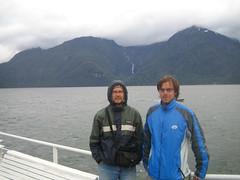Lobo, the Jungle Wolf
Clayton here. It's been two good weeks. We relaxed in Lima for a couple days, getting organized. Our last item on the checklist for Peru was the jungle. 26 hours on a bus took us to Tarapoto. From there we caught a "three" hour taxi to Yurimaguas, where we were to catch a riverboat at 2:00 in the afternoon. The taxi left late, but the driver assured us that the boat always leaves two hours late. Four hours later and of course we had missed the boat. Typical. No big deal as they leave daily. So we spent a free night on the next day's boat, sleeping in our newly purchased hammocks. Two more relaxing nights on the river and we were in Iquitos, a city the size of Winnipeg, situated at the beginning of the Amazon river. That afternoon we were on our way with Jungle Wolf Expeditions, one of the many tour operators in Iquitos. Lobo, which in spanish means "wolf", owned the company and was also our guide for four days (and four nights, all of which were spent in hammocks; they are more comfortable than I thought). We stayed that night at his house on the river, in the little village of Puerto Miguel, surrounded by the water of the Rio Yurapa (there wasn't much dry ground to be seen, as the rainy season ended only a month ago, though by the end of the week the level had dropped a half metre). Having grown up in the jungle, Lobo did not disappoint. We woke to a beautiful sunrise and immediately went fishing for breakfast. Using a bamboo spear with three prongs on the end, throwing from the front of the canoe, he speared about a dozen fish in less than an hour. Twice he skewered two fish at once. I couldn't even see them let alone hit anything. After a breakfast of fried fish and fried bananas, he informed us that he needed to make medicine for his sister, who apparently is dying of cancer (Lobo is also a bit of a shaman). So the rest of the day was spent with his brother Raul. We searched for wildlife along the river, cruising in a canoe. In the afternoon we watched the river dolphins. They were curious enough to come right under the boat, but when I got enough courage to jump in the water they stayed about fifty yards away (which was fine by me). That night we searched for cayman but were stymied. The next day we travelled two and a half hours by canoe into the jungle. We were joined there by Sebastian and Veronica, a Polish couple Lobo had brought along. Raul knew they were close long before they arrived. He and Lobo were calling to each other with an animal sound, deep and throaty. Normally, it seemed they were a very quiet people, almost speaking in whispers when passing by on the river, often quietly laughing. The campsite was just a clearing where we strung our hammocks, with mosquito nets. As far as the mosquitoes go, they were no worse than in Manitoba, and really only at night (still bad I guess). Apparently they are far worse in the wet season. Moving on: we went for a walk exploring the plants and searching for animals. We saw rubber flow from a tree (the base of the early economy of Iquitos), we ate some palm fruit, which he had to hack open with a machete, and we drank water from a vine, which tasted great. He taught us about the benefits of jungle garlic, tree resin and other plants, but we declined to try the hallucinogenic ayahuascar "medicine". We saw a host of birds, including parrots, scarlet macaws and a toucan. He was able to call monkeys close enough to where, if we ran we could catch a glimpse, and he caught a snake from a tree, which we all got to hold. That night we searched for cayman again. On the way Lobo caught a catfish with his hand (I think the croc hunter has nothing on this guy). We all got to hold the cayman he caught, and then Sebastian grabbed the next one, an impressive feat. The scenery was truly amazing; thousands of fireflies, the stars reflecting off the mirror like water and the exotic sounds of the jungle. Unforgettable. Our last day was the most memorable. We travelled back to Lobo's house then took a motorpowered canoe to search for more animals, the sloth in particular. After a couple of hours with no luck we headed back for lunch. Then Raul spotted one, far above in the tree top, thirty feet above the water. Raul is probably 40 years old, but he was up that tree in no time and soon enough we were holding a wild sloth. Their claws are extremely sharp and they move far quicker than I had thought, when they are stimulated. And the sound it made was mournful, it really made me feel bad. Eventually we had to put him back, and on the rest of the way we saw four different kinds of monkeys in the trees, all very close. We were lucky. The rest of the night we relaxed, woke to a breakfast of piranha in the morning (which can grow to 25 kg), and headed back to Iquitos. Lobo's daughter had a shirt on which read "Life is Good", and after a shower I couldn't have agreed more.
Now we are in Trujillo, travelling back to Quito, and our time in South America is nearly over. Time to start thinking about lessons learned I guess.


0 Comments:
Post a Comment
<< Home